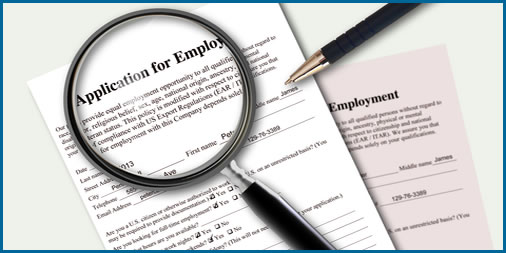The employee hiring process in today’s business climate is a complicated matter. You are tasked, as a business, to provide a safe working environment for your employees as well as a safe place for your customers to conduct business.
You also want to make sure that the employees you hire don’t have histories of stealing personal information from customers or coworkers, stealing inventory, or participating in other illegal activities on the job. It is your right and responsibility as a business owner to protect your interests.

Job seekers have legal rights during the hiring process. There are laws that protect those rights and those laws are constantly changing as various states and federal laws change to clarify, extend, or advance the protections to job seekers rights. That is one of the many reasons it is worth your while to consider having a professional employment screening agency conduct the background checks for you. Professional employment screening agencies keep up with the latest laws and required changes.
These are two other reasons professional background screening can help to protect your business and simplify the hiring process..
- Verification of references and employment history can be conducted by professional employment screening companies. One of the most tedious aspects of following up on job candidates is the verification of references and work history. As a result, many companies fail to perform due diligence in this aspect. By turning to employment screening professionals, you’re able to outsource the less attractive aspects of the hiring process of new employees.
- You can choose the type(s) of background screenings that are conducted according to the position. There are several different types of background checks businesses can conduct, providing you obtain proper authorization to do so, including basic criminal searches, comprehensive criminal background searches (including searches of terrorist watch lists), employment verification, military service verification, driving records investigations, credit reports, and even verification of education.
Allowing a professional employment screening agency to do the heavy lifting, when it comes to vetting potential employees during the hiring process, can give you free time to learn more about what the candidate has to offer your company.
Disclaimer Statement: All information presented is for information purposes only and is not intended to provide professional or legal advice regarding actions to take in any situation.


 So, your business is so busy that you need to hire additional help – congratulations! This is a major milestone for a sole proprietor. However, hiring employees is both a responsibility and a commitment. Here are six key points to consider, remember and put into practice when hiring your first employee:
So, your business is so busy that you need to hire additional help – congratulations! This is a major milestone for a sole proprietor. However, hiring employees is both a responsibility and a commitment. Here are six key points to consider, remember and put into practice when hiring your first employee:
 The Occupational Safety and Health Administration, also known as OSHA, promotes the security and safety of all employees in the workplace through the United States Department of Labor. Since 1971, the regulations put in place by this agency let workplaces and employers learn how to prevent accidents, falls, and on-the-job injuries as well as what to do if those injuries occur.
The Occupational Safety and Health Administration, also known as OSHA, promotes the security and safety of all employees in the workplace through the United States Department of Labor. Since 1971, the regulations put in place by this agency let workplaces and employers learn how to prevent accidents, falls, and on-the-job injuries as well as what to do if those injuries occur. Over the last 12 years, the evolution of social media has influenced how organizations execute their marketing, recruiting and job candidate screening efforts. Many employers have turned towards using social media screenings in favor of more conventional practices during their hiring initiatives. They know that social networking sites are a fertile source for unfiltered and insightful information on candidates that is open to public view. As a result, employers often believe that they are free to use a candidate’s publicly available information during the hiring process without facing any legal repercussions. But, this can prove to be a grave misjudgment that can result in a litany of litigation problems.
Over the last 12 years, the evolution of social media has influenced how organizations execute their marketing, recruiting and job candidate screening efforts. Many employers have turned towards using social media screenings in favor of more conventional practices during their hiring initiatives. They know that social networking sites are a fertile source for unfiltered and insightful information on candidates that is open to public view. As a result, employers often believe that they are free to use a candidate’s publicly available information during the hiring process without facing any legal repercussions. But, this can prove to be a grave misjudgment that can result in a litany of litigation problems.